ENTREPRENEURSHIP AND SMALL BUSINESS MANAGEMENT REPORT - UK Economy
VerifiedAdded on 2021/01/14
|21
|6345
|233
Report
AI Summary
This report on entrepreneurship and small business management provides a comprehensive overview of various entrepreneurial ventures and their relationship with different typologies. It examines the similarities and differences between these ventures, exploring aspects like scalability, size, goals, risks, and employee numbers. The report delves into the statistical impact of micro and small businesses on the UK's economy, highlighting their contribution to growth, innovation, and employment. It further investigates the role of small businesses and startups in the social economy, particularly after Brexit. Additionally, the report includes mini-research to identify the key characteristics, traits, and skills that distinguish successful entrepreneurs from typical business managers. It analyzes aspects of entrepreneurial personality that reflect motivation and mindset, and discusses background factors that may hinder or foster entrepreneurship. The report concludes with a summary of findings and references used.

ENTREPRENEURSHIP AND
SMALL BUSINESS MANAGEMENT
SMALL BUSINESS MANAGEMENT
Paraphrase This Document
Need a fresh take? Get an instant paraphrase of this document with our AI Paraphraser
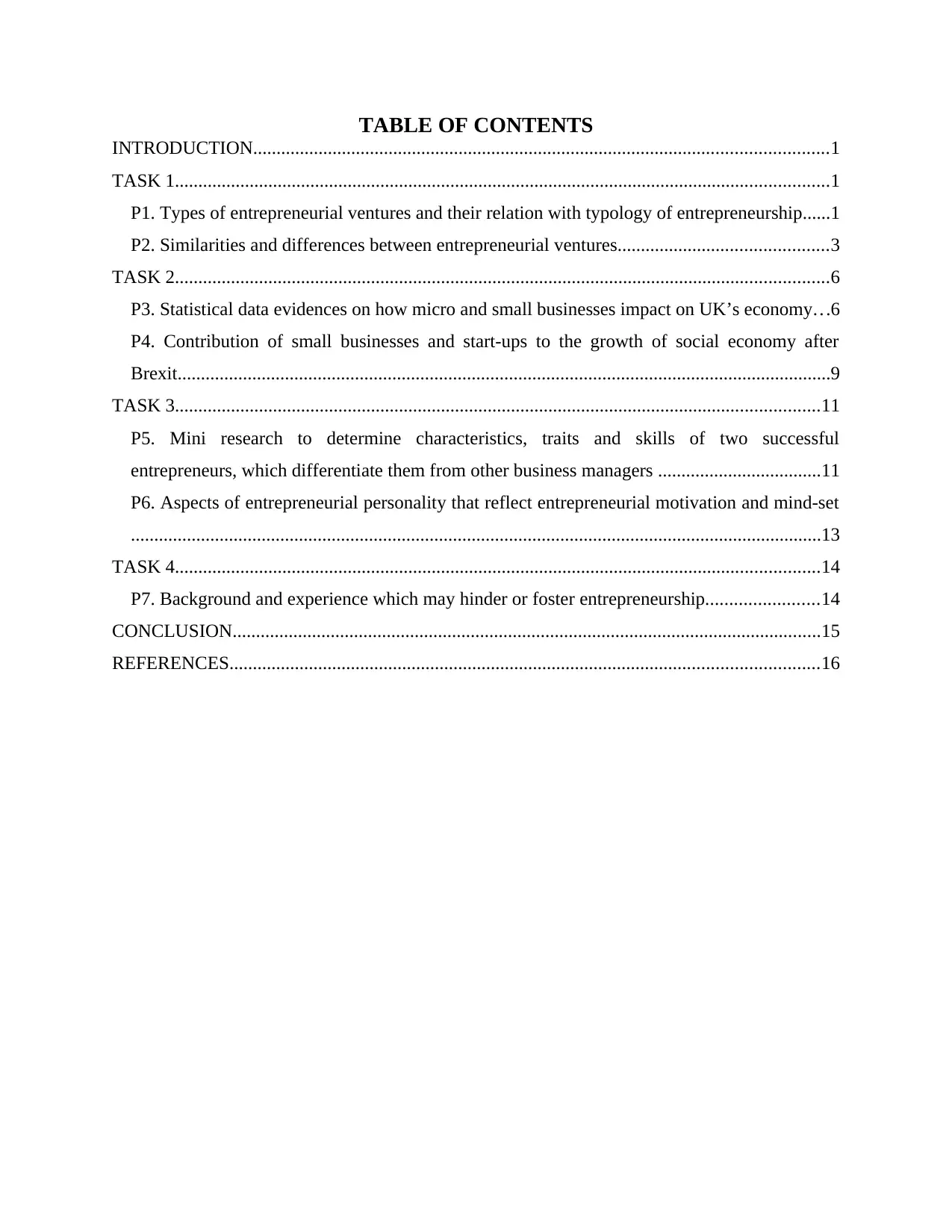
TABLE OF CONTENTS
INTRODUCTION...........................................................................................................................1
TASK 1............................................................................................................................................1
P1. Types of entrepreneurial ventures and their relation with typology of entrepreneurship......1
P2. Similarities and differences between entrepreneurial ventures.............................................3
TASK 2............................................................................................................................................6
P3. Statistical data evidences on how micro and small businesses impact on UK’s economy.. .6
P4. Contribution of small businesses and start-ups to the growth of social economy after
Brexit............................................................................................................................................9
TASK 3..........................................................................................................................................11
P5. Mini research to determine characteristics, traits and skills of two successful
entrepreneurs, which differentiate them from other business managers ...................................11
P6. Aspects of entrepreneurial personality that reflect entrepreneurial motivation and mind-set
....................................................................................................................................................13
TASK 4..........................................................................................................................................14
P7. Background and experience which may hinder or foster entrepreneurship........................14
CONCLUSION..............................................................................................................................15
REFERENCES..............................................................................................................................16
INTRODUCTION...........................................................................................................................1
TASK 1............................................................................................................................................1
P1. Types of entrepreneurial ventures and their relation with typology of entrepreneurship......1
P2. Similarities and differences between entrepreneurial ventures.............................................3
TASK 2............................................................................................................................................6
P3. Statistical data evidences on how micro and small businesses impact on UK’s economy.. .6
P4. Contribution of small businesses and start-ups to the growth of social economy after
Brexit............................................................................................................................................9
TASK 3..........................................................................................................................................11
P5. Mini research to determine characteristics, traits and skills of two successful
entrepreneurs, which differentiate them from other business managers ...................................11
P6. Aspects of entrepreneurial personality that reflect entrepreneurial motivation and mind-set
....................................................................................................................................................13
TASK 4..........................................................................................................................................14
P7. Background and experience which may hinder or foster entrepreneurship........................14
CONCLUSION..............................................................................................................................15
REFERENCES..............................................................................................................................16
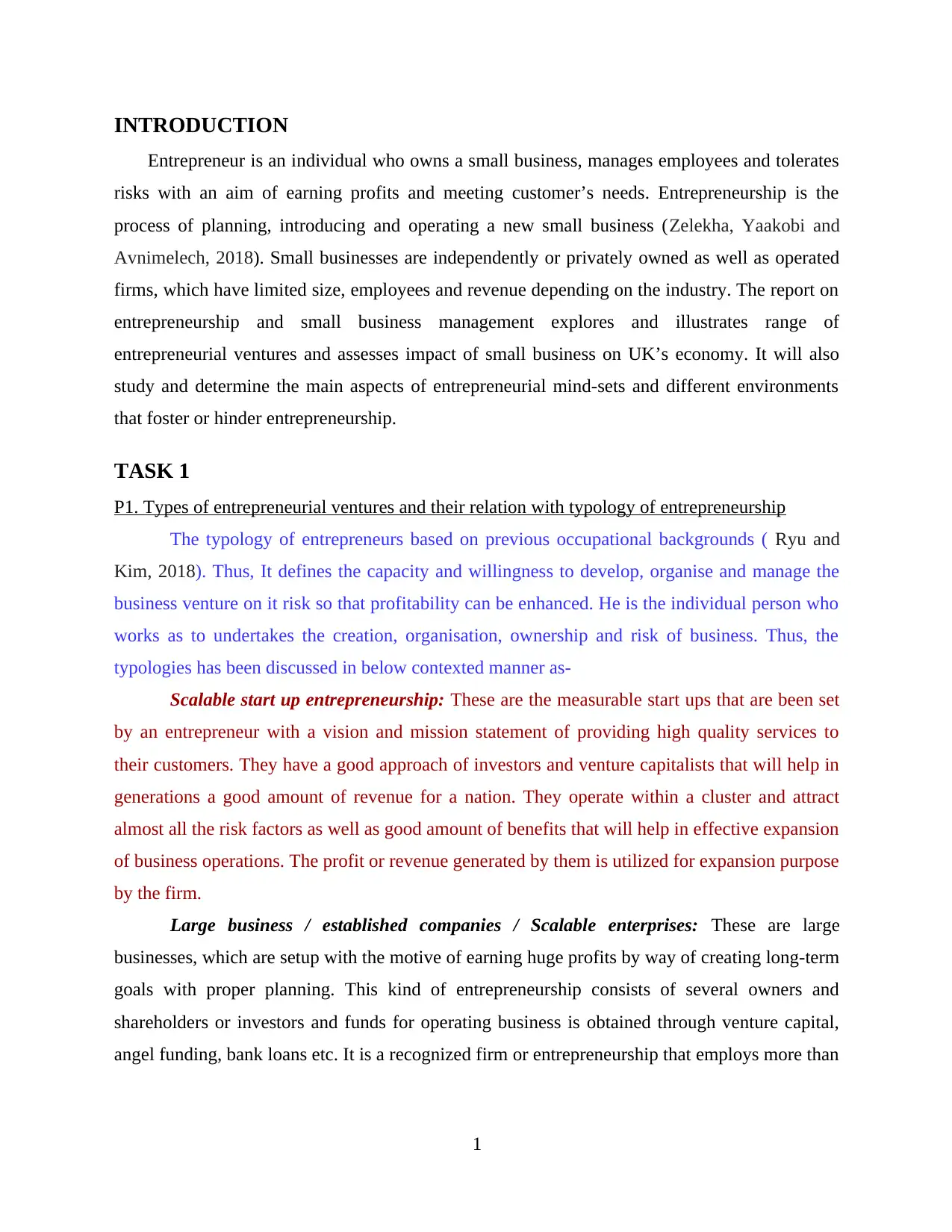
INTRODUCTION
Entrepreneur is an individual who owns a small business, manages employees and tolerates
risks with an aim of earning profits and meeting customer’s needs. Entrepreneurship is the
process of planning, introducing and operating a new small business (Zelekha, Yaakobi and
Avnimelech, 2018). Small businesses are independently or privately owned as well as operated
firms, which have limited size, employees and revenue depending on the industry. The report on
entrepreneurship and small business management explores and illustrates range of
entrepreneurial ventures and assesses impact of small business on UK’s economy. It will also
study and determine the main aspects of entrepreneurial mind-sets and different environments
that foster or hinder entrepreneurship.
TASK 1
P1. Types of entrepreneurial ventures and their relation with typology of entrepreneurship
The typology of entrepreneurs based on previous occupational backgrounds ( Ryu and
Kim, 2018). Thus, It defines the capacity and willingness to develop, organise and manage the
business venture on it risk so that profitability can be enhanced. He is the individual person who
works as to undertakes the creation, organisation, ownership and risk of business. Thus, the
typologies has been discussed in below contexted manner as-
Scalable start up entrepreneurship: These are the measurable start ups that are been set
by an entrepreneur with a vision and mission statement of providing high quality services to
their customers. They have a good approach of investors and venture capitalists that will help in
generations a good amount of revenue for a nation. They operate within a cluster and attract
almost all the risk factors as well as good amount of benefits that will help in effective expansion
of business operations. The profit or revenue generated by them is utilized for expansion purpose
by the firm.
Large business / established companies / Scalable enterprises: These are large
businesses, which are setup with the motive of earning huge profits by way of creating long-term
goals with proper planning. This kind of entrepreneurship consists of several owners and
shareholders or investors and funds for operating business is obtained through venture capital,
angel funding, bank loans etc. It is a recognized firm or entrepreneurship that employs more than
1
Entrepreneur is an individual who owns a small business, manages employees and tolerates
risks with an aim of earning profits and meeting customer’s needs. Entrepreneurship is the
process of planning, introducing and operating a new small business (Zelekha, Yaakobi and
Avnimelech, 2018). Small businesses are independently or privately owned as well as operated
firms, which have limited size, employees and revenue depending on the industry. The report on
entrepreneurship and small business management explores and illustrates range of
entrepreneurial ventures and assesses impact of small business on UK’s economy. It will also
study and determine the main aspects of entrepreneurial mind-sets and different environments
that foster or hinder entrepreneurship.
TASK 1
P1. Types of entrepreneurial ventures and their relation with typology of entrepreneurship
The typology of entrepreneurs based on previous occupational backgrounds ( Ryu and
Kim, 2018). Thus, It defines the capacity and willingness to develop, organise and manage the
business venture on it risk so that profitability can be enhanced. He is the individual person who
works as to undertakes the creation, organisation, ownership and risk of business. Thus, the
typologies has been discussed in below contexted manner as-
Scalable start up entrepreneurship: These are the measurable start ups that are been set
by an entrepreneur with a vision and mission statement of providing high quality services to
their customers. They have a good approach of investors and venture capitalists that will help in
generations a good amount of revenue for a nation. They operate within a cluster and attract
almost all the risk factors as well as good amount of benefits that will help in effective expansion
of business operations. The profit or revenue generated by them is utilized for expansion purpose
by the firm.
Large business / established companies / Scalable enterprises: These are large
businesses, which are setup with the motive of earning huge profits by way of creating long-term
goals with proper planning. This kind of entrepreneurship consists of several owners and
shareholders or investors and funds for operating business is obtained through venture capital,
angel funding, bank loans etc. It is a recognized firm or entrepreneurship that employs more than
1
⊘ This is a preview!⊘
Do you want full access?
Subscribe today to unlock all pages.

Trusted by 1+ million students worldwide
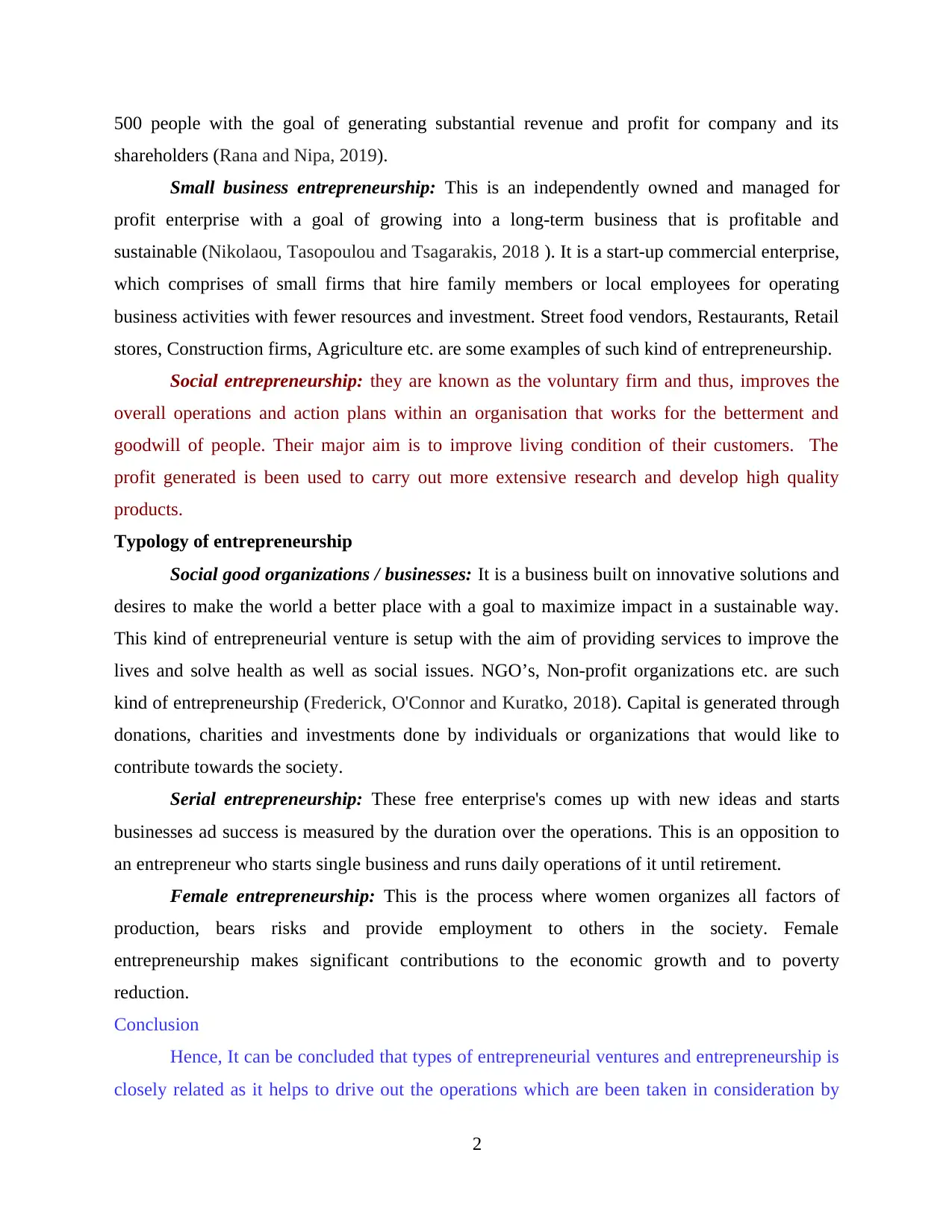
500 people with the goal of generating substantial revenue and profit for company and its
shareholders (Rana and Nipa, 2019).
Small business entrepreneurship: This is an independently owned and managed for
profit enterprise with a goal of growing into a long-term business that is profitable and
sustainable (Nikolaou, Tasopoulou and Tsagarakis, 2018 ). It is a start-up commercial enterprise,
which comprises of small firms that hire family members or local employees for operating
business activities with fewer resources and investment. Street food vendors, Restaurants, Retail
stores, Construction firms, Agriculture etc. are some examples of such kind of entrepreneurship.
Social entrepreneurship: they are known as the voluntary firm and thus, improves the
overall operations and action plans within an organisation that works for the betterment and
goodwill of people. Their major aim is to improve living condition of their customers. The
profit generated is been used to carry out more extensive research and develop high quality
products.
Typology of entrepreneurship
Social good organizations / businesses: It is a business built on innovative solutions and
desires to make the world a better place with a goal to maximize impact in a sustainable way.
This kind of entrepreneurial venture is setup with the aim of providing services to improve the
lives and solve health as well as social issues. NGO’s, Non-profit organizations etc. are such
kind of entrepreneurship (Frederick, O'Connor and Kuratko, 2018). Capital is generated through
donations, charities and investments done by individuals or organizations that would like to
contribute towards the society.
Serial entrepreneurship: These free enterprise's comes up with new ideas and starts
businesses ad success is measured by the duration over the operations. This is an opposition to
an entrepreneur who starts single business and runs daily operations of it until retirement.
Female entrepreneurship: This is the process where women organizes all factors of
production, bears risks and provide employment to others in the society. Female
entrepreneurship makes significant contributions to the economic growth and to poverty
reduction.
Conclusion
Hence, It can be concluded that types of entrepreneurial ventures and entrepreneurship is
closely related as it helps to drive out the operations which are been taken in consideration by
2
shareholders (Rana and Nipa, 2019).
Small business entrepreneurship: This is an independently owned and managed for
profit enterprise with a goal of growing into a long-term business that is profitable and
sustainable (Nikolaou, Tasopoulou and Tsagarakis, 2018 ). It is a start-up commercial enterprise,
which comprises of small firms that hire family members or local employees for operating
business activities with fewer resources and investment. Street food vendors, Restaurants, Retail
stores, Construction firms, Agriculture etc. are some examples of such kind of entrepreneurship.
Social entrepreneurship: they are known as the voluntary firm and thus, improves the
overall operations and action plans within an organisation that works for the betterment and
goodwill of people. Their major aim is to improve living condition of their customers. The
profit generated is been used to carry out more extensive research and develop high quality
products.
Typology of entrepreneurship
Social good organizations / businesses: It is a business built on innovative solutions and
desires to make the world a better place with a goal to maximize impact in a sustainable way.
This kind of entrepreneurial venture is setup with the aim of providing services to improve the
lives and solve health as well as social issues. NGO’s, Non-profit organizations etc. are such
kind of entrepreneurship (Frederick, O'Connor and Kuratko, 2018). Capital is generated through
donations, charities and investments done by individuals or organizations that would like to
contribute towards the society.
Serial entrepreneurship: These free enterprise's comes up with new ideas and starts
businesses ad success is measured by the duration over the operations. This is an opposition to
an entrepreneur who starts single business and runs daily operations of it until retirement.
Female entrepreneurship: This is the process where women organizes all factors of
production, bears risks and provide employment to others in the society. Female
entrepreneurship makes significant contributions to the economic growth and to poverty
reduction.
Conclusion
Hence, It can be concluded that types of entrepreneurial ventures and entrepreneurship is
closely related as it helps to drive out the operations which are been taken in consideration by
2
Paraphrase This Document
Need a fresh take? Get an instant paraphrase of this document with our AI Paraphraser
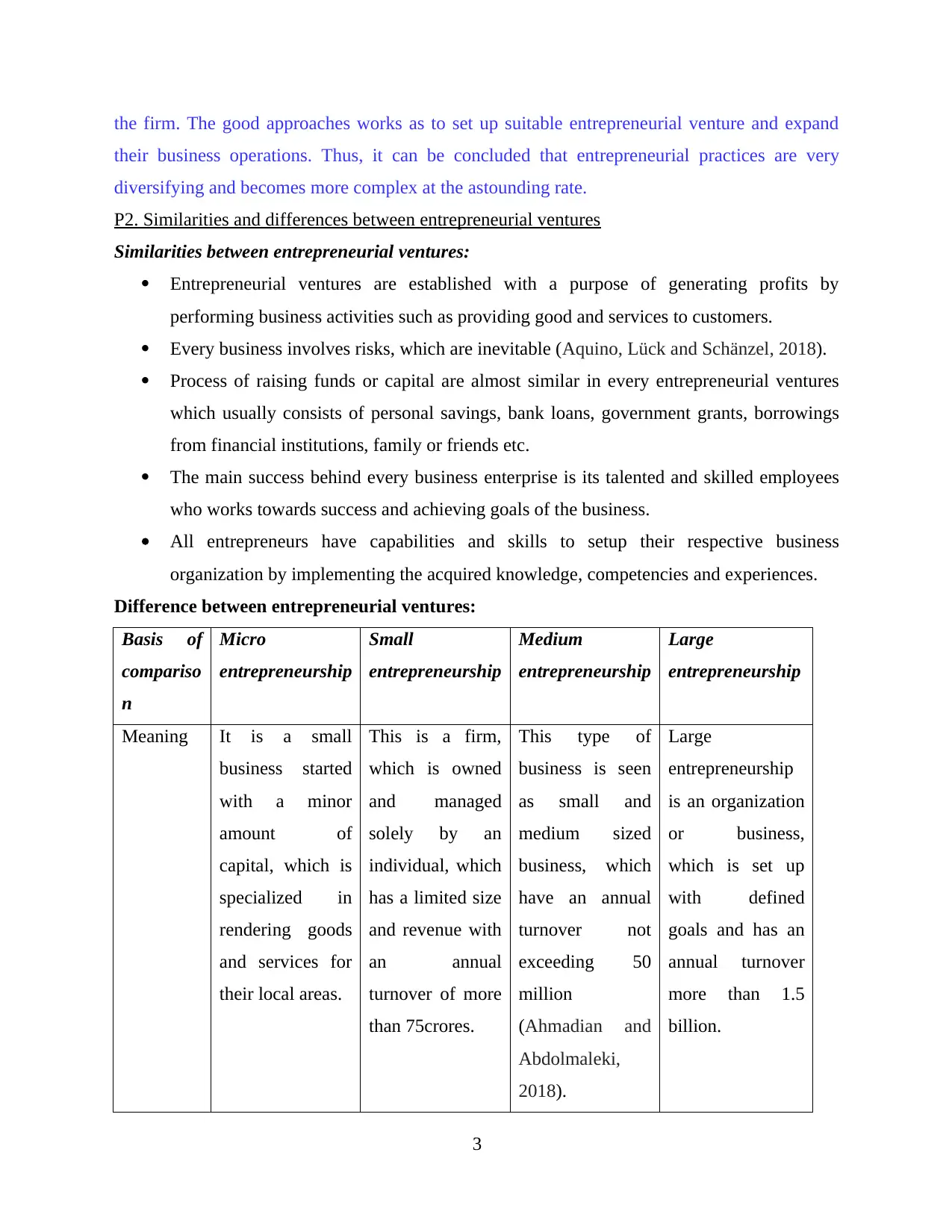
the firm. The good approaches works as to set up suitable entrepreneurial venture and expand
their business operations. Thus, it can be concluded that entrepreneurial practices are very
diversifying and becomes more complex at the astounding rate.
P2. Similarities and differences between entrepreneurial ventures
Similarities between entrepreneurial ventures:
Entrepreneurial ventures are established with a purpose of generating profits by
performing business activities such as providing good and services to customers.
Every business involves risks, which are inevitable (Aquino, Lück and Schänzel, 2018).
Process of raising funds or capital are almost similar in every entrepreneurial ventures
which usually consists of personal savings, bank loans, government grants, borrowings
from financial institutions, family or friends etc.
The main success behind every business enterprise is its talented and skilled employees
who works towards success and achieving goals of the business.
All entrepreneurs have capabilities and skills to setup their respective business
organization by implementing the acquired knowledge, competencies and experiences.
Difference between entrepreneurial ventures:
Basis of
compariso
n
Micro
entrepreneurship
Small
entrepreneurship
Medium
entrepreneurship
Large
entrepreneurship
Meaning It is a small
business started
with a minor
amount of
capital, which is
specialized in
rendering goods
and services for
their local areas.
This is a firm,
which is owned
and managed
solely by an
individual, which
has a limited size
and revenue with
an annual
turnover of more
than 75crores.
This type of
business is seen
as small and
medium sized
business, which
have an annual
turnover not
exceeding 50
million
(Ahmadian and
Abdolmaleki,
2018).
Large
entrepreneurship
is an organization
or business,
which is set up
with defined
goals and has an
annual turnover
more than 1.5
billion.
3
their business operations. Thus, it can be concluded that entrepreneurial practices are very
diversifying and becomes more complex at the astounding rate.
P2. Similarities and differences between entrepreneurial ventures
Similarities between entrepreneurial ventures:
Entrepreneurial ventures are established with a purpose of generating profits by
performing business activities such as providing good and services to customers.
Every business involves risks, which are inevitable (Aquino, Lück and Schänzel, 2018).
Process of raising funds or capital are almost similar in every entrepreneurial ventures
which usually consists of personal savings, bank loans, government grants, borrowings
from financial institutions, family or friends etc.
The main success behind every business enterprise is its talented and skilled employees
who works towards success and achieving goals of the business.
All entrepreneurs have capabilities and skills to setup their respective business
organization by implementing the acquired knowledge, competencies and experiences.
Difference between entrepreneurial ventures:
Basis of
compariso
n
Micro
entrepreneurship
Small
entrepreneurship
Medium
entrepreneurship
Large
entrepreneurship
Meaning It is a small
business started
with a minor
amount of
capital, which is
specialized in
rendering goods
and services for
their local areas.
This is a firm,
which is owned
and managed
solely by an
individual, which
has a limited size
and revenue with
an annual
turnover of more
than 75crores.
This type of
business is seen
as small and
medium sized
business, which
have an annual
turnover not
exceeding 50
million
(Ahmadian and
Abdolmaleki,
2018).
Large
entrepreneurship
is an organization
or business,
which is set up
with defined
goals and has an
annual turnover
more than 1.5
billion.
3
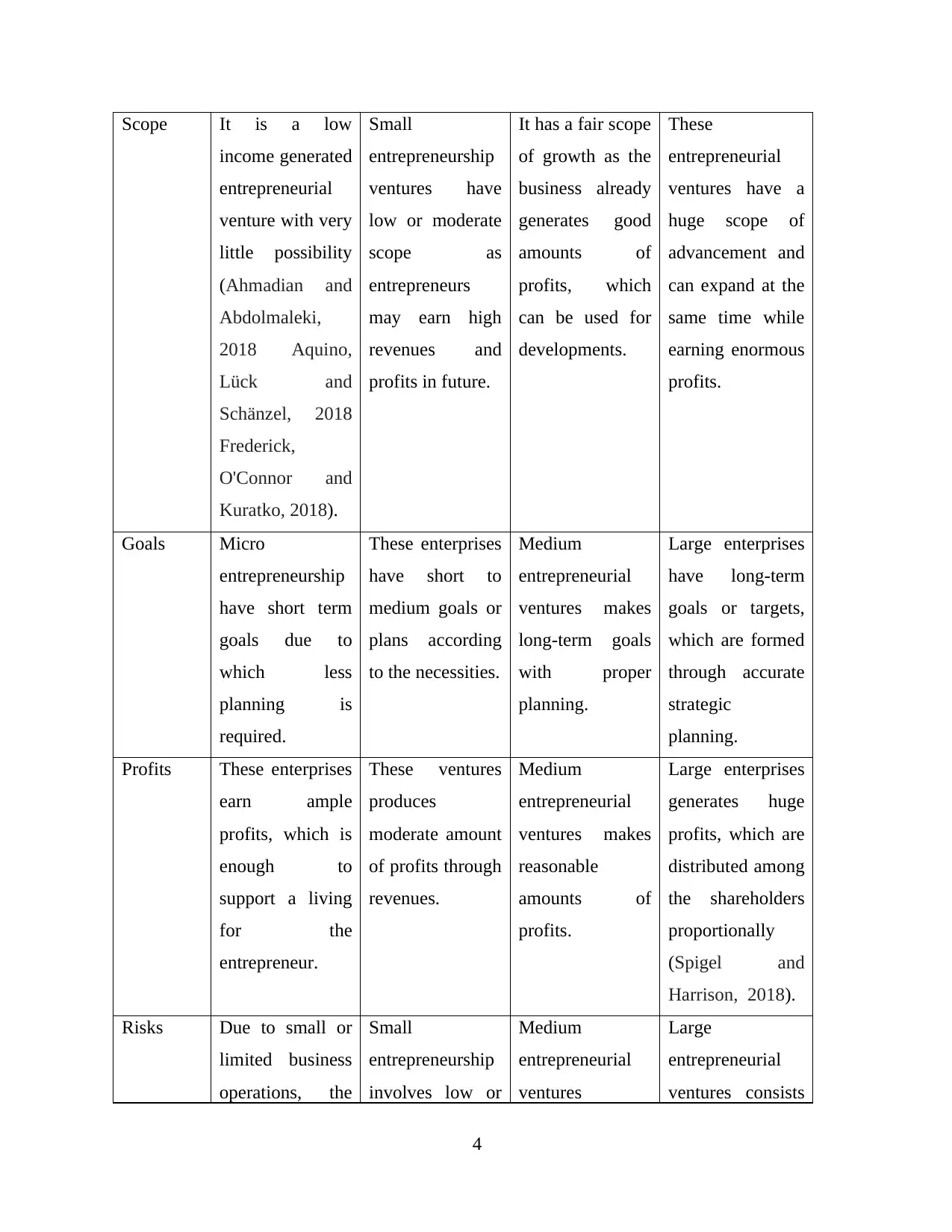
Scope It is a low
income generated
entrepreneurial
venture with very
little possibility
(Ahmadian and
Abdolmaleki,
2018 Aquino,
Lück and
Schänzel, 2018
Frederick,
O'Connor and
Kuratko, 2018).
Small
entrepreneurship
ventures have
low or moderate
scope as
entrepreneurs
may earn high
revenues and
profits in future.
It has a fair scope
of growth as the
business already
generates good
amounts of
profits, which
can be used for
developments.
These
entrepreneurial
ventures have a
huge scope of
advancement and
can expand at the
same time while
earning enormous
profits.
Goals Micro
entrepreneurship
have short term
goals due to
which less
planning is
required.
These enterprises
have short to
medium goals or
plans according
to the necessities.
Medium
entrepreneurial
ventures makes
long-term goals
with proper
planning.
Large enterprises
have long-term
goals or targets,
which are formed
through accurate
strategic
planning.
Profits These enterprises
earn ample
profits, which is
enough to
support a living
for the
entrepreneur.
These ventures
produces
moderate amount
of profits through
revenues.
Medium
entrepreneurial
ventures makes
reasonable
amounts of
profits.
Large enterprises
generates huge
profits, which are
distributed among
the shareholders
proportionally
(Spigel and
Harrison, 2018).
Risks Due to small or
limited business
operations, the
Small
entrepreneurship
involves low or
Medium
entrepreneurial
ventures
Large
entrepreneurial
ventures consists
4
income generated
entrepreneurial
venture with very
little possibility
(Ahmadian and
Abdolmaleki,
2018 Aquino,
Lück and
Schänzel, 2018
Frederick,
O'Connor and
Kuratko, 2018).
Small
entrepreneurship
ventures have
low or moderate
scope as
entrepreneurs
may earn high
revenues and
profits in future.
It has a fair scope
of growth as the
business already
generates good
amounts of
profits, which
can be used for
developments.
These
entrepreneurial
ventures have a
huge scope of
advancement and
can expand at the
same time while
earning enormous
profits.
Goals Micro
entrepreneurship
have short term
goals due to
which less
planning is
required.
These enterprises
have short to
medium goals or
plans according
to the necessities.
Medium
entrepreneurial
ventures makes
long-term goals
with proper
planning.
Large enterprises
have long-term
goals or targets,
which are formed
through accurate
strategic
planning.
Profits These enterprises
earn ample
profits, which is
enough to
support a living
for the
entrepreneur.
These ventures
produces
moderate amount
of profits through
revenues.
Medium
entrepreneurial
ventures makes
reasonable
amounts of
profits.
Large enterprises
generates huge
profits, which are
distributed among
the shareholders
proportionally
(Spigel and
Harrison, 2018).
Risks Due to small or
limited business
operations, the
Small
entrepreneurship
involves low or
Medium
entrepreneurial
ventures
Large
entrepreneurial
ventures consists
4
⊘ This is a preview!⊘
Do you want full access?
Subscribe today to unlock all pages.

Trusted by 1+ million students worldwide
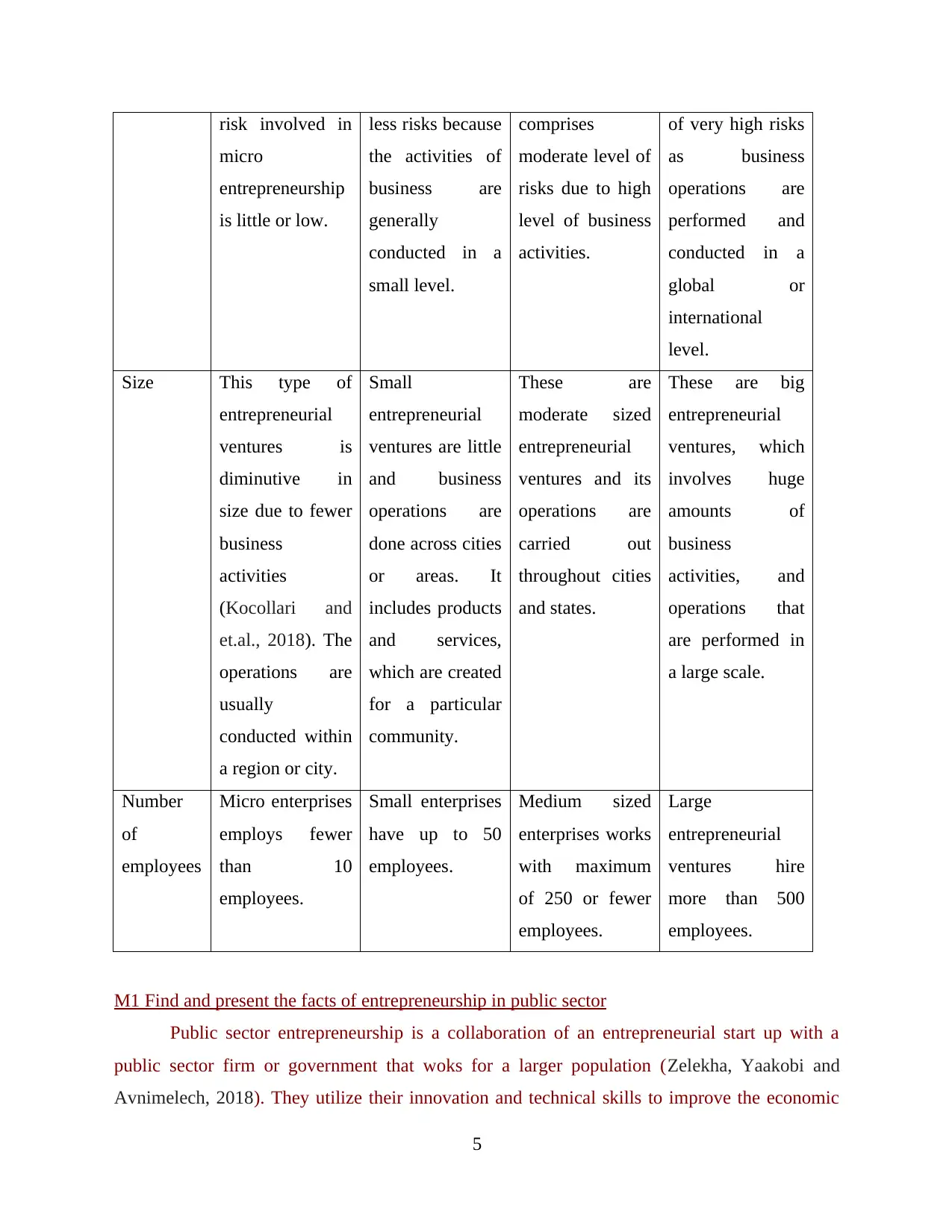
risk involved in
micro
entrepreneurship
is little or low.
less risks because
the activities of
business are
generally
conducted in a
small level.
comprises
moderate level of
risks due to high
level of business
activities.
of very high risks
as business
operations are
performed and
conducted in a
global or
international
level.
Size This type of
entrepreneurial
ventures is
diminutive in
size due to fewer
business
activities
(Kocollari and
et.al., 2018). The
operations are
usually
conducted within
a region or city.
Small
entrepreneurial
ventures are little
and business
operations are
done across cities
or areas. It
includes products
and services,
which are created
for a particular
community.
These are
moderate sized
entrepreneurial
ventures and its
operations are
carried out
throughout cities
and states.
These are big
entrepreneurial
ventures, which
involves huge
amounts of
business
activities, and
operations that
are performed in
a large scale.
Number
of
employees
Micro enterprises
employs fewer
than 10
employees.
Small enterprises
have up to 50
employees.
Medium sized
enterprises works
with maximum
of 250 or fewer
employees.
Large
entrepreneurial
ventures hire
more than 500
employees.
M1 Find and present the facts of entrepreneurship in public sector
Public sector entrepreneurship is a collaboration of an entrepreneurial start up with a
public sector firm or government that woks for a larger population (Zelekha, Yaakobi and
Avnimelech, 2018). They utilize their innovation and technical skills to improve the economic
5
micro
entrepreneurship
is little or low.
less risks because
the activities of
business are
generally
conducted in a
small level.
comprises
moderate level of
risks due to high
level of business
activities.
of very high risks
as business
operations are
performed and
conducted in a
global or
international
level.
Size This type of
entrepreneurial
ventures is
diminutive in
size due to fewer
business
activities
(Kocollari and
et.al., 2018). The
operations are
usually
conducted within
a region or city.
Small
entrepreneurial
ventures are little
and business
operations are
done across cities
or areas. It
includes products
and services,
which are created
for a particular
community.
These are
moderate sized
entrepreneurial
ventures and its
operations are
carried out
throughout cities
and states.
These are big
entrepreneurial
ventures, which
involves huge
amounts of
business
activities, and
operations that
are performed in
a large scale.
Number
of
employees
Micro enterprises
employs fewer
than 10
employees.
Small enterprises
have up to 50
employees.
Medium sized
enterprises works
with maximum
of 250 or fewer
employees.
Large
entrepreneurial
ventures hire
more than 500
employees.
M1 Find and present the facts of entrepreneurship in public sector
Public sector entrepreneurship is a collaboration of an entrepreneurial start up with a
public sector firm or government that woks for a larger population (Zelekha, Yaakobi and
Avnimelech, 2018). They utilize their innovation and technical skills to improve the economic
5
Paraphrase This Document
Need a fresh take? Get an instant paraphrase of this document with our AI Paraphraser

conditions and cater a larger customer base. It will help in proper evaluation of customer's needs
and demands to have a good revenue generation.
D1 Critically examine the development and growth of entrepreneurial ventures
The entrepreneurial ventures will help in proper assessment of the growth measures that
are taken within the organisation and thus will lead the firm to improve the quality of services
and products offered by an entrepreneurial venture. At the initial stage, suitable business idea is
been identified that helps the firm to improve quality of services and thus, will lead the firm to
analyse the needs and demands of an entrepreneurial ventures and thus, will help in appropriate
planning of operations that will help in planning of innovative products and services and meeting
requirements of their buyers.
6
and demands to have a good revenue generation.
D1 Critically examine the development and growth of entrepreneurial ventures
The entrepreneurial ventures will help in proper assessment of the growth measures that
are taken within the organisation and thus will lead the firm to improve the quality of services
and products offered by an entrepreneurial venture. At the initial stage, suitable business idea is
been identified that helps the firm to improve quality of services and thus, will lead the firm to
analyse the needs and demands of an entrepreneurial ventures and thus, will help in appropriate
planning of operations that will help in planning of innovative products and services and meeting
requirements of their buyers.
6
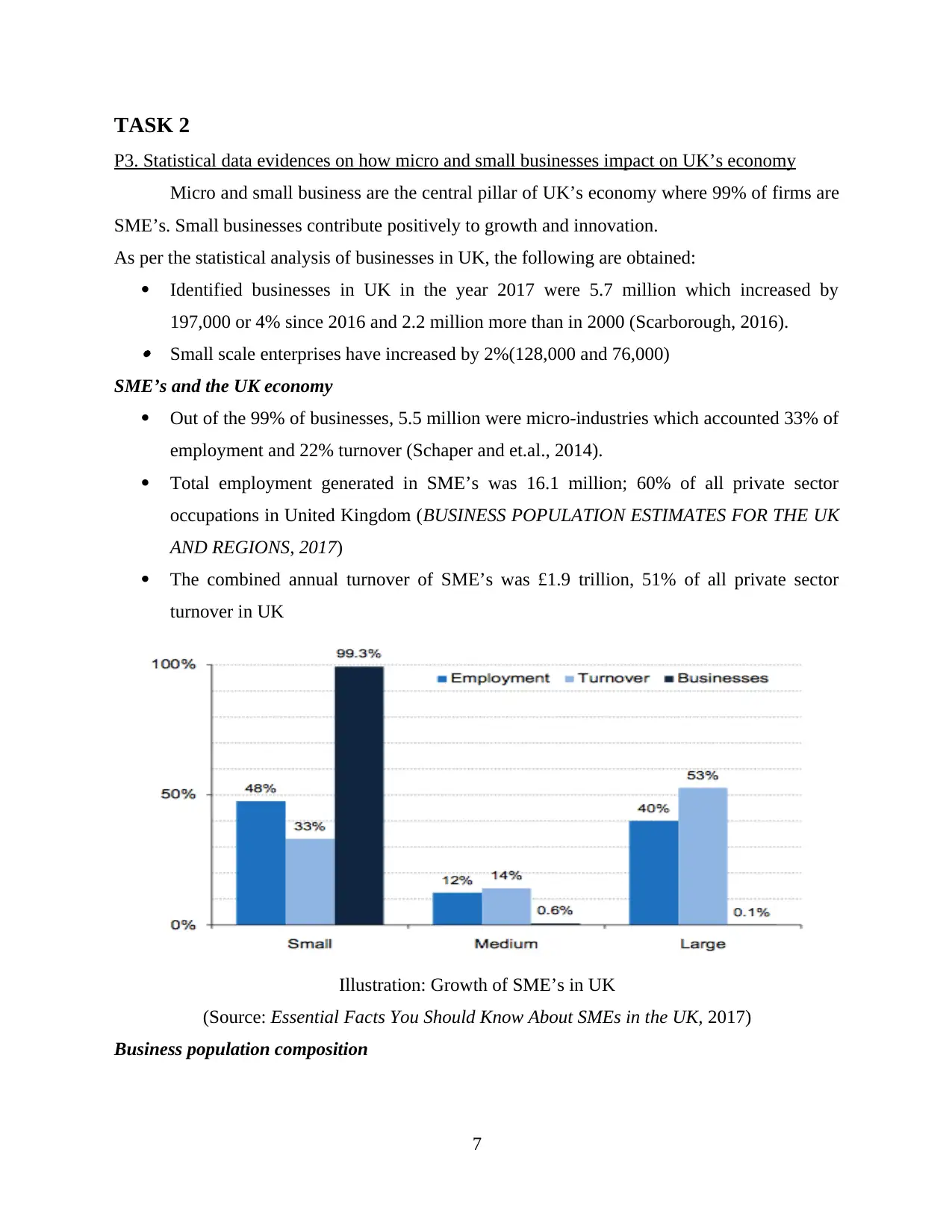
TASK 2
P3. Statistical data evidences on how micro and small businesses impact on UK’s economy
Micro and small business are the central pillar of UK’s economy where 99% of firms are
SME’s. Small businesses contribute positively to growth and innovation.
As per the statistical analysis of businesses in UK, the following are obtained:
Identified businesses in UK in the year 2017 were 5.7 million which increased by
197,000 or 4% since 2016 and 2.2 million more than in 2000 (Scarborough, 2016). Small scale enterprises have increased by 2%(128,000 and 76,000)
SME’s and the UK economy
Out of the 99% of businesses, 5.5 million were micro-industries which accounted 33% of
employment and 22% turnover (Schaper and et.al., 2014).
Total employment generated in SME’s was 16.1 million; 60% of all private sector
occupations in United Kingdom (BUSINESS POPULATION ESTIMATES FOR THE UK
AND REGIONS, 2017)
The combined annual turnover of SME’s was £1.9 trillion, 51% of all private sector
turnover in UK
Illustration: Growth of SME’s in UK
(Source: Essential Facts You Should Know About SMEs in the UK, 2017)
Business population composition
7
P3. Statistical data evidences on how micro and small businesses impact on UK’s economy
Micro and small business are the central pillar of UK’s economy where 99% of firms are
SME’s. Small businesses contribute positively to growth and innovation.
As per the statistical analysis of businesses in UK, the following are obtained:
Identified businesses in UK in the year 2017 were 5.7 million which increased by
197,000 or 4% since 2016 and 2.2 million more than in 2000 (Scarborough, 2016). Small scale enterprises have increased by 2%(128,000 and 76,000)
SME’s and the UK economy
Out of the 99% of businesses, 5.5 million were micro-industries which accounted 33% of
employment and 22% turnover (Schaper and et.al., 2014).
Total employment generated in SME’s was 16.1 million; 60% of all private sector
occupations in United Kingdom (BUSINESS POPULATION ESTIMATES FOR THE UK
AND REGIONS, 2017)
The combined annual turnover of SME’s was £1.9 trillion, 51% of all private sector
turnover in UK
Illustration: Growth of SME’s in UK
(Source: Essential Facts You Should Know About SMEs in the UK, 2017)
Business population composition
7
⊘ This is a preview!⊘
Do you want full access?
Subscribe today to unlock all pages.

Trusted by 1+ million students worldwide
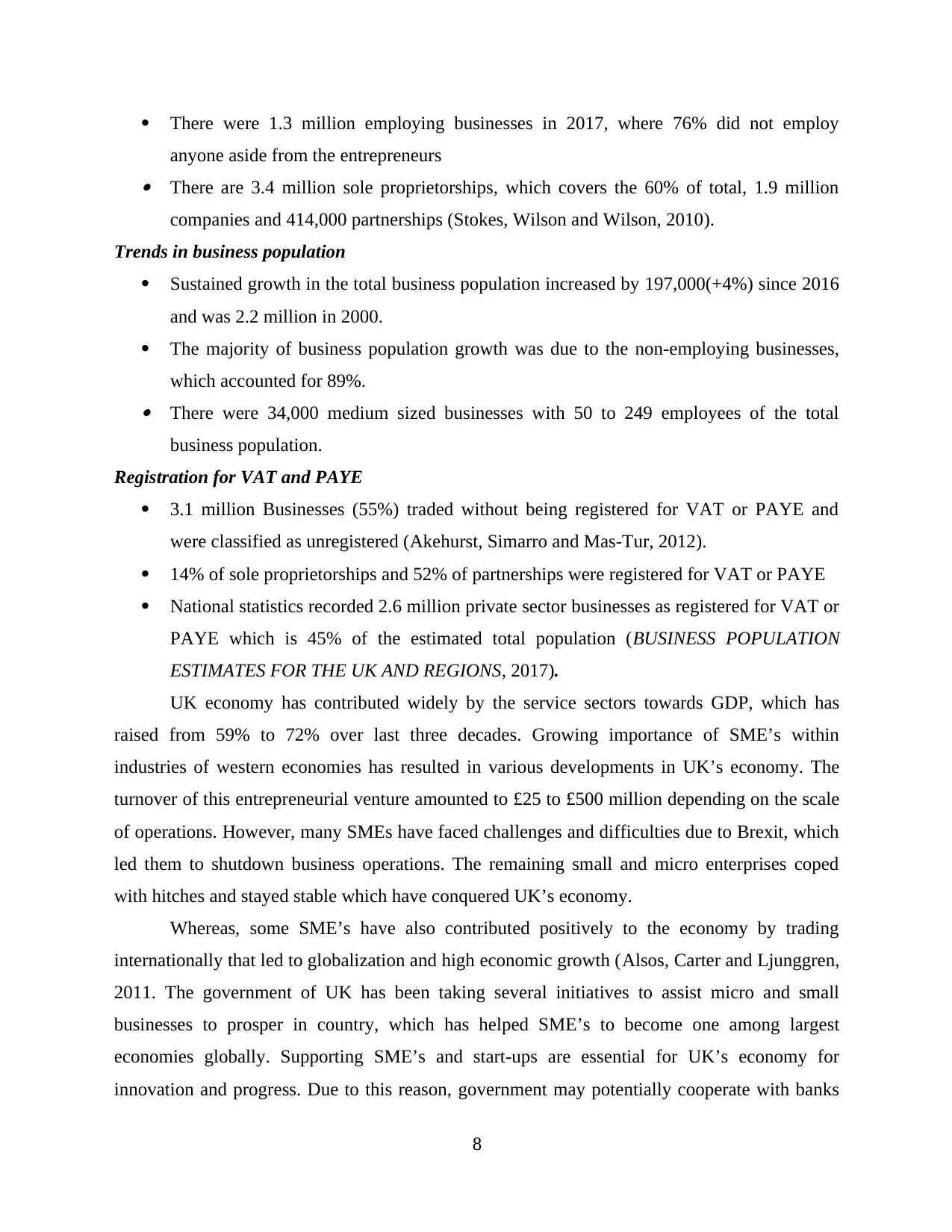
There were 1.3 million employing businesses in 2017, where 76% did not employ
anyone aside from the entrepreneurs There are 3.4 million sole proprietorships, which covers the 60% of total, 1.9 million
companies and 414,000 partnerships (Stokes, Wilson and Wilson, 2010).
Trends in business population
Sustained growth in the total business population increased by 197,000(+4%) since 2016
and was 2.2 million in 2000.
The majority of business population growth was due to the non-employing businesses,
which accounted for 89%. There were 34,000 medium sized businesses with 50 to 249 employees of the total
business population.
Registration for VAT and PAYE
3.1 million Businesses (55%) traded without being registered for VAT or PAYE and
were classified as unregistered (Akehurst, Simarro and Mas‐Tur, 2012).
14% of sole proprietorships and 52% of partnerships were registered for VAT or PAYE
National statistics recorded 2.6 million private sector businesses as registered for VAT or
PAYE which is 45% of the estimated total population (BUSINESS POPULATION
ESTIMATES FOR THE UK AND REGIONS, 2017).
UK economy has contributed widely by the service sectors towards GDP, which has
raised from 59% to 72% over last three decades. Growing importance of SME’s within
industries of western economies has resulted in various developments in UK’s economy. The
turnover of this entrepreneurial venture amounted to £25 to £500 million depending on the scale
of operations. However, many SMEs have faced challenges and difficulties due to Brexit, which
led them to shutdown business operations. The remaining small and micro enterprises coped
with hitches and stayed stable which have conquered UK’s economy.
Whereas, some SME’s have also contributed positively to the economy by trading
internationally that led to globalization and high economic growth (Alsos, Carter and Ljunggren,
2011. The government of UK has been taking several initiatives to assist micro and small
businesses to prosper in country, which has helped SME’s to become one among largest
economies globally. Supporting SME’s and start-ups are essential for UK’s economy for
innovation and progress. Due to this reason, government may potentially cooperate with banks
8
anyone aside from the entrepreneurs There are 3.4 million sole proprietorships, which covers the 60% of total, 1.9 million
companies and 414,000 partnerships (Stokes, Wilson and Wilson, 2010).
Trends in business population
Sustained growth in the total business population increased by 197,000(+4%) since 2016
and was 2.2 million in 2000.
The majority of business population growth was due to the non-employing businesses,
which accounted for 89%. There were 34,000 medium sized businesses with 50 to 249 employees of the total
business population.
Registration for VAT and PAYE
3.1 million Businesses (55%) traded without being registered for VAT or PAYE and
were classified as unregistered (Akehurst, Simarro and Mas‐Tur, 2012).
14% of sole proprietorships and 52% of partnerships were registered for VAT or PAYE
National statistics recorded 2.6 million private sector businesses as registered for VAT or
PAYE which is 45% of the estimated total population (BUSINESS POPULATION
ESTIMATES FOR THE UK AND REGIONS, 2017).
UK economy has contributed widely by the service sectors towards GDP, which has
raised from 59% to 72% over last three decades. Growing importance of SME’s within
industries of western economies has resulted in various developments in UK’s economy. The
turnover of this entrepreneurial venture amounted to £25 to £500 million depending on the scale
of operations. However, many SMEs have faced challenges and difficulties due to Brexit, which
led them to shutdown business operations. The remaining small and micro enterprises coped
with hitches and stayed stable which have conquered UK’s economy.
Whereas, some SME’s have also contributed positively to the economy by trading
internationally that led to globalization and high economic growth (Alsos, Carter and Ljunggren,
2011. The government of UK has been taking several initiatives to assist micro and small
businesses to prosper in country, which has helped SME’s to become one among largest
economies globally. Supporting SME’s and start-ups are essential for UK’s economy for
innovation and progress. Due to this reason, government may potentially cooperate with banks
8
Paraphrase This Document
Need a fresh take? Get an instant paraphrase of this document with our AI Paraphraser
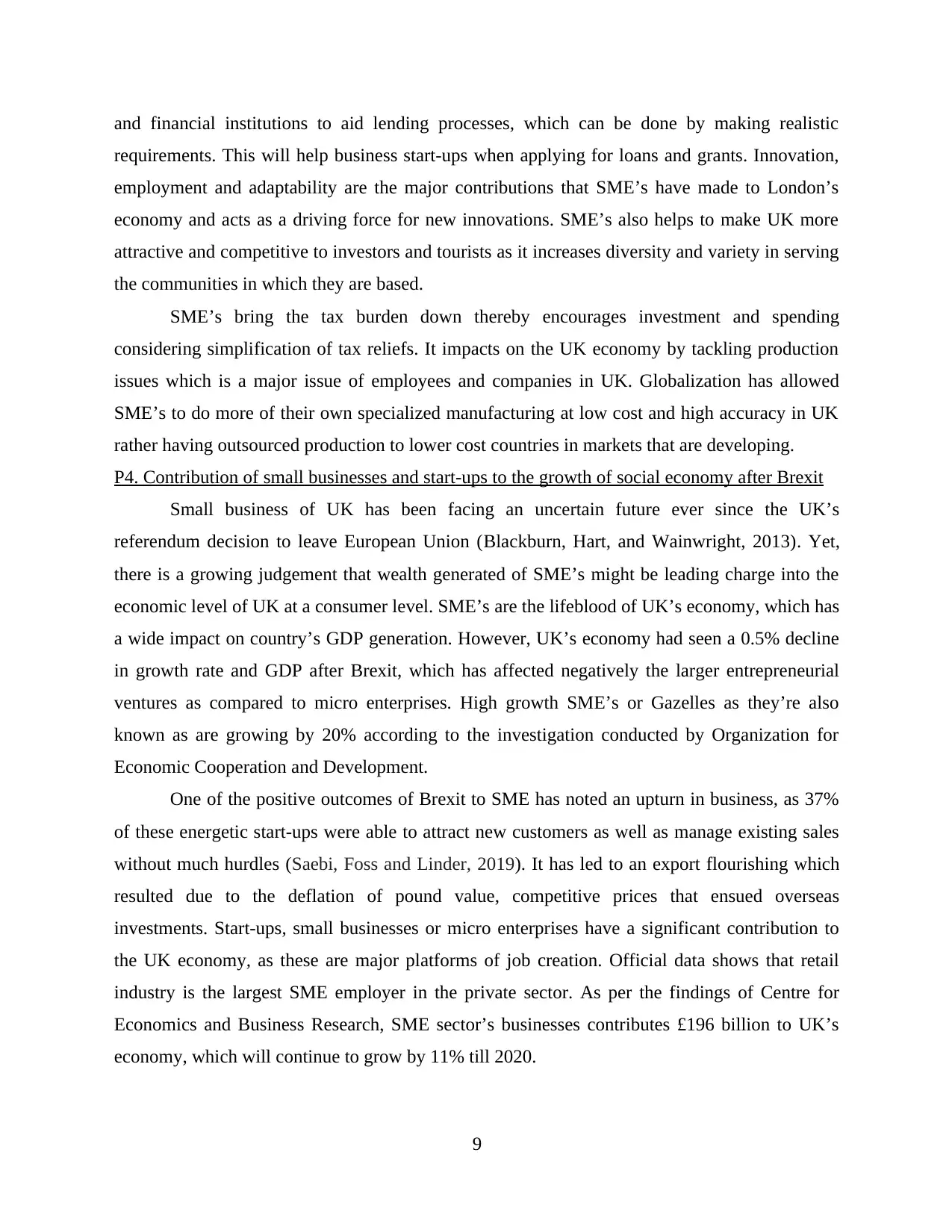
and financial institutions to aid lending processes, which can be done by making realistic
requirements. This will help business start-ups when applying for loans and grants. Innovation,
employment and adaptability are the major contributions that SME’s have made to London’s
economy and acts as a driving force for new innovations. SME’s also helps to make UK more
attractive and competitive to investors and tourists as it increases diversity and variety in serving
the communities in which they are based.
SME’s bring the tax burden down thereby encourages investment and spending
considering simplification of tax reliefs. It impacts on the UK economy by tackling production
issues which is a major issue of employees and companies in UK. Globalization has allowed
SME’s to do more of their own specialized manufacturing at low cost and high accuracy in UK
rather having outsourced production to lower cost countries in markets that are developing.
P4. Contribution of small businesses and start-ups to the growth of social economy after Brexit
Small business of UK has been facing an uncertain future ever since the UK’s
referendum decision to leave European Union (Blackburn, Hart, and Wainwright, 2013). Yet,
there is a growing judgement that wealth generated of SME’s might be leading charge into the
economic level of UK at a consumer level. SME’s are the lifeblood of UK’s economy, which has
a wide impact on country’s GDP generation. However, UK’s economy had seen a 0.5% decline
in growth rate and GDP after Brexit, which has affected negatively the larger entrepreneurial
ventures as compared to micro enterprises. High growth SME’s or Gazelles as they’re also
known as are growing by 20% according to the investigation conducted by Organization for
Economic Cooperation and Development.
One of the positive outcomes of Brexit to SME has noted an upturn in business, as 37%
of these energetic start-ups were able to attract new customers as well as manage existing sales
without much hurdles (Saebi, Foss and Linder, 2019). It has led to an export flourishing which
resulted due to the deflation of pound value, competitive prices that ensued overseas
investments. Start-ups, small businesses or micro enterprises have a significant contribution to
the UK economy, as these are major platforms of job creation. Official data shows that retail
industry is the largest SME employer in the private sector. As per the findings of Centre for
Economics and Business Research, SME sector’s businesses contributes £196 billion to UK’s
economy, which will continue to grow by 11% till 2020.
9
requirements. This will help business start-ups when applying for loans and grants. Innovation,
employment and adaptability are the major contributions that SME’s have made to London’s
economy and acts as a driving force for new innovations. SME’s also helps to make UK more
attractive and competitive to investors and tourists as it increases diversity and variety in serving
the communities in which they are based.
SME’s bring the tax burden down thereby encourages investment and spending
considering simplification of tax reliefs. It impacts on the UK economy by tackling production
issues which is a major issue of employees and companies in UK. Globalization has allowed
SME’s to do more of their own specialized manufacturing at low cost and high accuracy in UK
rather having outsourced production to lower cost countries in markets that are developing.
P4. Contribution of small businesses and start-ups to the growth of social economy after Brexit
Small business of UK has been facing an uncertain future ever since the UK’s
referendum decision to leave European Union (Blackburn, Hart, and Wainwright, 2013). Yet,
there is a growing judgement that wealth generated of SME’s might be leading charge into the
economic level of UK at a consumer level. SME’s are the lifeblood of UK’s economy, which has
a wide impact on country’s GDP generation. However, UK’s economy had seen a 0.5% decline
in growth rate and GDP after Brexit, which has affected negatively the larger entrepreneurial
ventures as compared to micro enterprises. High growth SME’s or Gazelles as they’re also
known as are growing by 20% according to the investigation conducted by Organization for
Economic Cooperation and Development.
One of the positive outcomes of Brexit to SME has noted an upturn in business, as 37%
of these energetic start-ups were able to attract new customers as well as manage existing sales
without much hurdles (Saebi, Foss and Linder, 2019). It has led to an export flourishing which
resulted due to the deflation of pound value, competitive prices that ensued overseas
investments. Start-ups, small businesses or micro enterprises have a significant contribution to
the UK economy, as these are major platforms of job creation. Official data shows that retail
industry is the largest SME employer in the private sector. As per the findings of Centre for
Economics and Business Research, SME sector’s businesses contributes £196 billion to UK’s
economy, which will continue to grow by 11% till 2020.
9
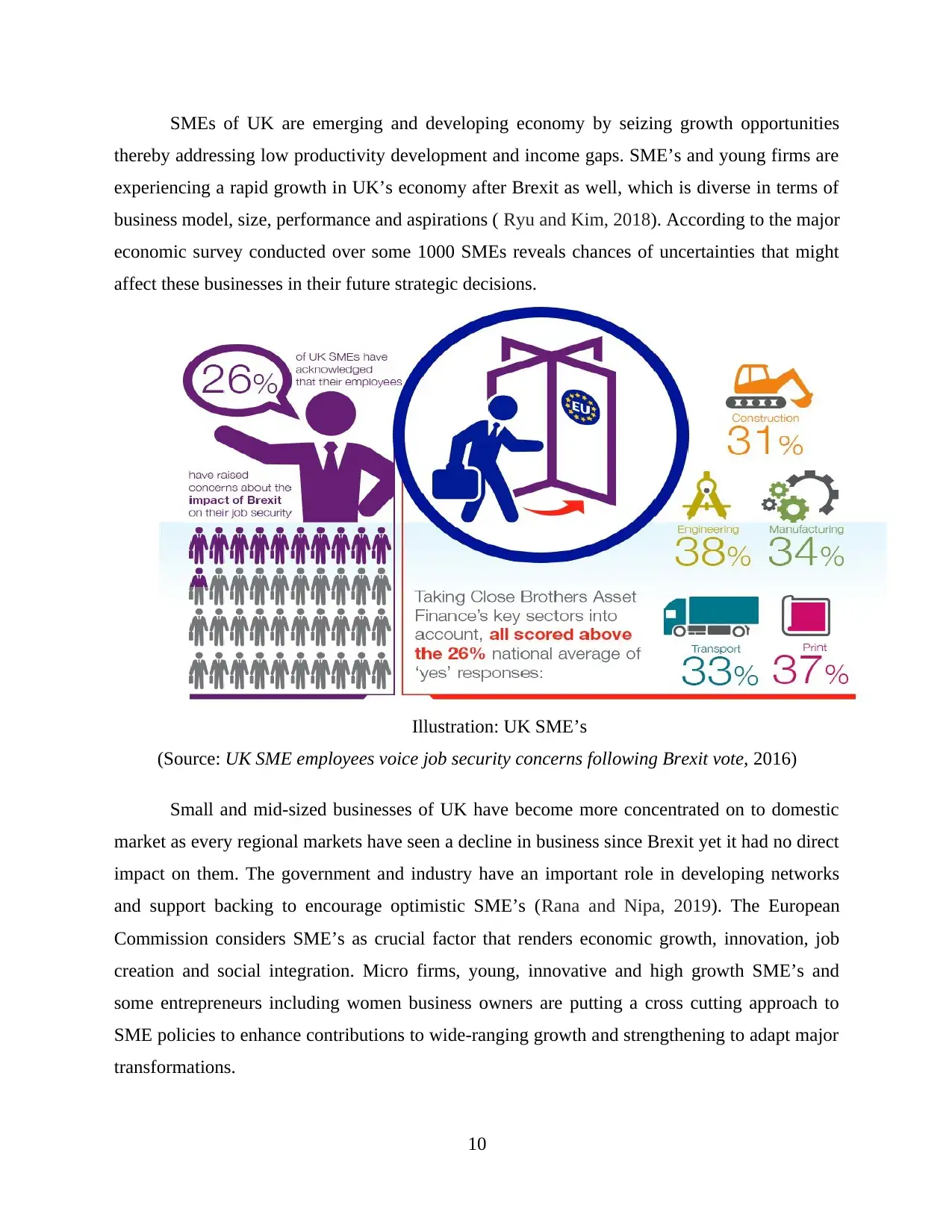
SMEs of UK are emerging and developing economy by seizing growth opportunities
thereby addressing low productivity development and income gaps. SME’s and young firms are
experiencing a rapid growth in UK’s economy after Brexit as well, which is diverse in terms of
business model, size, performance and aspirations ( Ryu and Kim, 2018). According to the major
economic survey conducted over some 1000 SMEs reveals chances of uncertainties that might
affect these businesses in their future strategic decisions.
Illustration: UK SME’s
(Source: UK SME employees voice job security concerns following Brexit vote, 2016)
Small and mid-sized businesses of UK have become more concentrated on to domestic
market as every regional markets have seen a decline in business since Brexit yet it had no direct
impact on them. The government and industry have an important role in developing networks
and support backing to encourage optimistic SME’s (Rana and Nipa, 2019). The European
Commission considers SME’s as crucial factor that renders economic growth, innovation, job
creation and social integration. Micro firms, young, innovative and high growth SME’s and
some entrepreneurs including women business owners are putting a cross cutting approach to
SME policies to enhance contributions to wide-ranging growth and strengthening to adapt major
transformations.
10
thereby addressing low productivity development and income gaps. SME’s and young firms are
experiencing a rapid growth in UK’s economy after Brexit as well, which is diverse in terms of
business model, size, performance and aspirations ( Ryu and Kim, 2018). According to the major
economic survey conducted over some 1000 SMEs reveals chances of uncertainties that might
affect these businesses in their future strategic decisions.
Illustration: UK SME’s
(Source: UK SME employees voice job security concerns following Brexit vote, 2016)
Small and mid-sized businesses of UK have become more concentrated on to domestic
market as every regional markets have seen a decline in business since Brexit yet it had no direct
impact on them. The government and industry have an important role in developing networks
and support backing to encourage optimistic SME’s (Rana and Nipa, 2019). The European
Commission considers SME’s as crucial factor that renders economic growth, innovation, job
creation and social integration. Micro firms, young, innovative and high growth SME’s and
some entrepreneurs including women business owners are putting a cross cutting approach to
SME policies to enhance contributions to wide-ranging growth and strengthening to adapt major
transformations.
10
⊘ This is a preview!⊘
Do you want full access?
Subscribe today to unlock all pages.

Trusted by 1+ million students worldwide
1 out of 21
Related Documents
Your All-in-One AI-Powered Toolkit for Academic Success.
+13062052269
info@desklib.com
Available 24*7 on WhatsApp / Email
![[object Object]](/_next/static/media/star-bottom.7253800d.svg)
Unlock your academic potential
Copyright © 2020–2026 A2Z Services. All Rights Reserved. Developed and managed by ZUCOL.





